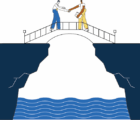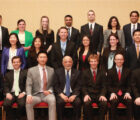I enjoy visiting universities and speaking with students about the actuarial profession. The students have a lot of energy, ask great questions and are eager to learn. After visiting six U.S. schools that won the CAS University Award in 2016 and 2017, and several schools outside the U.S., I am confident that the future of the actuarial profession is in very good hands.
One of the biggest changes since my university days is the vast diversity of the student body. I enjoy interacting with people from different cultures and backgrounds and believe that diverse teams are more productive as they bring together different viewpoints.
A 2015 report by McKinsey & Company, “Why Diversity Matters,”1 supports this. Based on its analysis of 366 public companies, it found that those in the top quartile for ethnic and racial diversity in management were 35 percent more likely to have financial returns above their industry mean.
I was fortunate to grow up in a diverse neighborhood in a south suburb of Chicago. The neighborhood consisted of working class families with diverse backgrounds, including African-American and Hispanic families. There were also many families made up of first-generation immigrants such as mine; my mother was born in Austria. I played a lot sports, and it was apparent to me at an early age that the most successful sports teams were diverse teams.
My experience in college, however, was that the advanced math classes were not very diverse. Most of the students were white males, with a few women and some Asian students.

Today, the mix of students from around the world attending U.S. universities is amazing. I have met students from Mongolia, Malaysia, Saudi Arabia, China, Africa and India. These students all speak multiple languages and their English is exceptional. Most of the students intend to work in the U.S.; however, some want to apply their actuarial skills to provide insurance solutions in their native countries. Those who do return to their home countries often bring the CAS with them, leading to greater participation in the CAS as well as growing our membership. This was apparent to me when I visited Malaysia. I met with many of our members there last year, some who studied and worked in the U.S. before moving back to Malaysia. These members have created a strong CAS community in Malaysia.
Students of color from the U.S. are also better represented in actuarial programs today. Many universities hold summer programs to educate high school students of color about the actuarial profession. Women are also better represented today and are taking leadership positions. Of the schools I visited, at least half of the presidents of the student actuarial clubs were women.
The students also are more active in volunteer activities, from educating high school students about the actuarial profession, to raising money to end childhood hunger in India. Today’s students seem to have a strong desire to give back to society.
A diverse student body can provide important and unique feedback in some cases. I know actuaries from Africa who were educated in the U.S. and who work in the U.S, on microinsurance projects for Africa such as crop insurance. This is a much needed coverage when weather interferes with crop yields. Individuals from these countries likely have a better knowledge of local customs that affect the insurance process.

The students also are very knowledgeable about the actuarial profession and ask great questions. One student, for example, asked me how credit score was first discovered as a reliable predictor of insurance losses.
Compared to my college days, women, people of color and those from other nations make up a larger share of the actuarial programs. Many of these individuals are also in leadership roles. When I think about how the variety of students will challenge one another and further the profession, I know the profession is in very good and capable hands.
1 mckinsey.com/business-functions/organization/our-insights/why-diversity-matters











